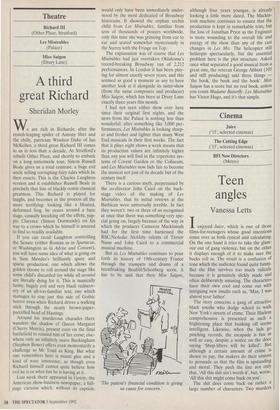Theatre
Richard III
(Other Place, Stratford) Les Miserables (Palace) Miss Saigon (Drury Lane)
A third great Richard
Sheridan Morley
We are rich in Richards: after the crutch-leaping spider of Antony Sher and the chilly, patrician Windsor Duke of Ian McKellen, a third great Richard III comes to us in less than a decade. At Stratford's rebuilt Other Place, and shortly -to embark on a long nationwide tour, Simon Russell Beale gives us a total contrast: a huge evil uncle telling corrupting fairy tales which he then enacts. This is the Charles Laughton version and it establishes Russell Beale in precisely that line of blackly comic classical greatness. This Richard is played for laughs, and becomes in the process all the more terrifying: looking like a bloated, deformed frog, he oozes around a bare stage, casually knocking off the effete, yup- pie Clarence (Simon Dormandy) on his way to a crown which he himself is amazed to find so readily available.
If you can recall Laughton controlling the Senate (either Roman as in Spartacus, or Washington as in Advise and Consent), you will have some idea of what is going on in Sam Mendes's brilliantly spare and sparse production, one which allows the golden throne to roll around the stage like some child's discarded toy while all around are literally dying for it. This is manically funny, hugely evil and very black rediscov- ery of an all-too-familiar text, one which manages to stay just this side of Gothic horror even when Richard drives a walking stick through the neatly brown-paper- parcelled head of Hastings.
Around his murderous charades there wanders the shadow of Queen Margaret (Cherry Morris), present even on the final battlefield to remind him of her curse; else- where only an infinitely suave Buckingham (Stephen Boxer) offers even momentarily a challenge to Mr Toad as King. But what one remembers here is manic glee and a kind of wary innocence, as though even Richard himself cannot quite believe how evil he is or what fun he is having at it.
Last week there appeared in Variety, the American show-business newspaper, a full- page cartoon which, without its caption, would only have been immediately under- stood by the most dedicated of Broadway historians. It showed the orphan urchin child from Les Miserables, familiar from tens of thousands of posters worldwide, only this time she was grinning from ear to ear and seated somewhat mysteriously in the Surrey with the Fringe on Top.
The explanation was of course that Les Miserables had just overtaken Oklahoma's record-breaking Broadway run of 2,212 performances. In London it has been play- ing for almost exactly seven years, and this seemed as good a moment as any to have another look at it alongside its sister-show (from the same composers and producer) Miss Saigon, which has been at Drury Lane exactly three years this month.
I had not seen either show over here since their original first nights, and the news from the Palace is nothing less than wonderful: after something like 3,000 per- formances, Les Miserables is looking sharp- er and fresher and tighter than many West End musicals in their first weeks. The fact that it plays eight shows a week means that its production values are infinitely higher than any you will find in the repertoire sys- tems of Covent Garden or the Coliseum, and Les Miserables now bids fair to become the musical not just of its decade but of the century itself.
There is a curious myth, perpetuated by the co-director John Caird on the back- stage video of the making of Les Miserables, that its initial reviews at the Barbican were universally terrible. In fact they weren't: two or three of us recognised at once that there was something very spe- cial going on, largely because of the way in which the producer Cameron Mackintosh had for the first time harnessed the RSC/Nicholas Nickleby talents of Trevor Nunn and John Caird to a commercial musical machine.
But as Les Miserables continues to pour forth its history of 19th-century France through the trumpets and drums of a breathtaking Boublil/Schonberg score, it has to be said that their Miss Saigon, The patient's financial condition is giving us cause for concern.' although four years younger, is already' looking a little more dated. The Mackin- tosh machine continues to ensure that the production is kept in remarkable trim, but the loss of Jonathan Pryce as the Engineer is more wounding to the overall life and energy of the show than any of the cast changes in Les Mis. The helicopter still helicopts spectacularly, but the essential problem here is the plot structure. Asked once what separated a good musical from a great one, the veteran George Abbott (105 and still producing) said three things 'the book, the book and the book'. Miss Saigon has a score but no real book, unless you count Madame Butterfly. Les Miserables has Victor Hugo, and it's that simple.


















































 Previous page
Previous page